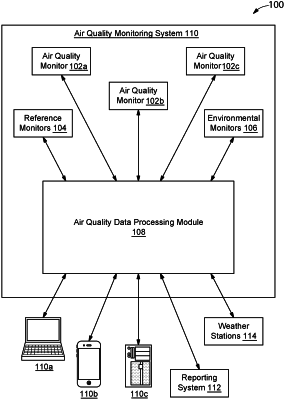| CPC G06Q 50/26 (2013.01) [G01W 1/10 (2013.01)] | 20 Claims |

|
1. An emission location method for identifying an emission source of a target substance at a site, the emission location method comprising:
providing a first air quality monitor comprising:
a first sensor responsive to an emissions event of the target substance; and
a first location at which the first air quality monitor is located on the site;
sensing, by the first air quality monitor, a first set of attached parameters at the first location;
transmitting the first set of attached parameters to a first server;
providing a supervisory control and data acquisition system (SCADA system) at the site, the SCADA system configured to:
supervise a physical factor and an operational factor of at least a first device at the site; and
acquire the physical factor and the operational factor from the first device at the site;
acquiring, with the SCADA system, a set of SCADA data from the first device;
transmitting the set of SCADA data to the first server;
training an emissions-location machine learning model with:
the first server,
the first set of attached parameters sensed by the first air quality monitor, and the set of SCADA data,
wherein the emissions-location machine learning model generates a first trained emissions-model parameter;
generating an emissions-simulation model of a plume of the target substance using the first trained emissions-model parameter;
monitoring, over a predefined time period and with the emissions-simulation model, the set of SCADA data, and the first set of attached parameters;
refining, iteratively and over the predefined time period, the emissions-simulation model based on monitoring, to a refined emissions-simulation model; and
locating the emission source of the target substance at the site with:
the refined emissions-simulation model,
the set of SCADA data, and
the first trained emissions-model parameter.
|